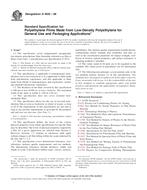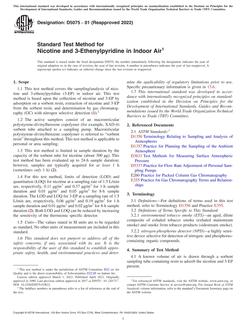Click here to purchase
Note: A new version of E1527 will be available in late November 2005.
1.1 Purpose -The purpose of this practice, as well as Practice E1528, is to define good commercial and customary practice in the United States of America for conducting an environmental site assessment of a parcel of commercial real estate with respect to the range of contaminants within the scope of Comprehensive Environmental Response, Compensation and Liability Act (CERCLA) and petroleum products . As such, this practice is intended to permit a user to satisfy one of the requirements to qualify for the innocent landowner defense to CERCLA liability: that is, the practices that constitute “all appropriate inquiry into the previous ownership and uses of the property consistent with good commercial or customary practice” as defined in 42 USC [section]9601(35)(B). (See Appendix X1 for an outline of CERCLA’s liability and defense provisions.)
1.1.1 Recognized Environmental Conditions -In defining a standard of good commercial and customary practice for conducting an environmental site assessment of a parcel of property , the goal of the processes established by this practice is to identify recognized environmental conditions . The term recognized environmental conditions means the presence or likely presence of any hazardous substances or petroleum products on a property under conditions that indicate an existing release, a past release, or a material threat of a release of any hazardous substances or petroleum products into structures on the property or into the ground, groundwater, or surface water of the property . The term includes hazardous substances or petroleum products even under conditions in compliance with laws. The term is not intended to include de minimis conditions that generally do not present a material risk of harm to public health or the environment and that generally would not be the subject of an enforcement action if brought to the attention of appropriate governmental agencies.
1.1.2 Two Related Practices -This practice is closely related to Practice E1528. Both are environmental site assessments for commercial real estate . See 4.3.
1.1.3 Petroleum Products – Petroleum products are included within the scope of both practices because they are of concern with respect to many parcels of commercial real estate and current custom and usage is to include an inquiry into the presence of petroleum products when doing an environmental site assessment of commercial real estate . Inclusion of petroleum products within the scope of this practice and Practice E 1528 is not based upon the applicability, if any, of CERCLA to petroleum products . (See Appendix X1 for discussion of petroleum exclusion to CERCLA liability.)
1.1.4 CERCLA Requirements Other Than Appropriate Inquiry -This practice does not address whether requirements in addition to appropriate inquiry have been met in order to qualify for CERCLA’s innocent landowner defense (for example, the duties specified in 42 USC [section]9607(b)(3)(a) and (b) and cited in Appendix X1).
1.1.5 Other Federal, State, and Local Environmental Laws -This practice does not address requirements of any state or local laws or of any federal laws other than the appropriate inquiry provisions of CERCLA’s innocent landowner defense . Users are cautioned that federal, state, and local laws may impose environmental assessment obligations that are beyond the scope of this practice. Users should also be aware that there are likely to be other legal obligations with regard to hazardous substances or petroleum products discovered on property that are not addressed in this practice and that may pose risks of civil and/or criminal sanctions for non-compliance.
1.1.6 Documentation- The scope of this practice includes research and reporting requirements that support the user’s ability to qualify for the innocent landowner defense. As such, sufficient documentation of all sources, records, and resources utilized in conducting the inquiry required by this practice must be provided in the written report (refer to 7.1.8 and 11.2).
1.2 Objectives -Objectives guiding the development of this practice and Practice E 1528 are (1) to synthesize and put in writing good commercial and customary practice for environmental site assessments for commercial real estate , (2) to facilitate high quality, standardized environmental site assessments , (3) to ensure that the standard of appropriate inquiry is practical and reasonable, and (4) to clarify an industry standard for appropriate inquiry in an effort to guide legal interpretation of CERCLA’s innocent landowner defense .
1.3 Considerations Beyond Scope -The use of this practice is strictly limited to the scope set forth in this section. Section 12 of this practice, identifies, for informational purposes, certain environmental conditions (not an all-inclusive list) that may exist on a property that are beyond the scope of this practice but may warrant consideration by parties to a commercial real estate transaction.
1.4 Organization of This Practice -This practice has several parts and two appendixes. Section 1 is the Scope. Section 2 is Referenced Documents. Section 3, Terminology, has definitions of terms not unique to this practice and descriptions of terms unique to this practice and acronyms. Section 4 is Significance and Use of this practice. Section 5 describes User’s Responsibilities. Sections 6 through 11 are the main body of the Phase I Environmental Site Assessment, including evaluation and report preparation. Section 12 provides additional information regarding non-scope considerations (see 1.3). The appendixes are included for information and are not part of the procedures prescribed in either this practice or Practice E1528. Appendix X1 explains the liability and defense provisions of CERCLA that will assist the user in understanding the user’s responsibilities under CERCLA; it also contains other important information regarding CERCLA and this practice. Appendix X2 provides a recommended table of contents and report format for a Phase I Environmental Site Assessment Report.
1.5 This standard does not purport to address all of the safety concerns, if any, associated with its use. It is the responsibility of the user of this standard to establish appropriate safety and health practices and determine the applicability of regulatory limitations prior to use. Description of Changes-In general, the standards have a stronger emphasis on business environmental risk as a driving force for due diligence in order to reflect the specific business needs and concerns of users.Specifically, among the 74 revisions to the standards, major areas of change include:
Additions and deletions in the terminology sections, including the addition of such terms as business environmental risk, activity and use limitations, engineering controls, institutional controls, historical recognized environmental condition, and material threat.
Additions to users’ responsibilities, such as the requirement to make known the reason for performing the ESA if other than to qualify for the innocent landowner defense under CERCLA.
The requirement to provide all supporting documentation in the report or have it adequately referenced to facilitate reconstruction of the assessment by another environmental profession
The addition of guidance to assist users in the preparation for and selection of an environmental professional to conduct a Phase I Site Assessment.
Product Details
- Published:
- 01/01/1997
- Number of Pages:
- 25
- File Size:
- 1 file , 270 KB


